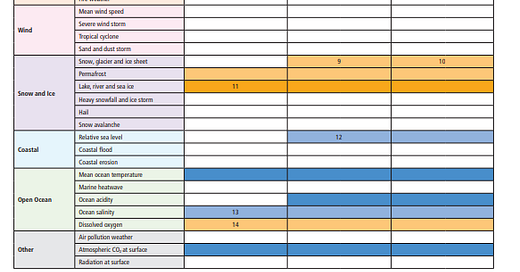Last week I wrote about a silly Gallup poll in A nonsensical poll from Gallup. In that post I presented data with evidence that so far there hasn’t been any increase in drought. It turns out I was listening to The Great Simplification podcast Scott Tinker: The Uncertain Future of Oil: Energy Poverty, Depletion, and 'Green' Ambitions (1/29/2025), and it pointed me to the chart below from the IPCC.
The chart below comes from the IPCC 6th Assessment Report Climate Change 2021: The Physical Science Basis. It is page 1856 of the full report. The chart has categories that climate change might impact. The last three columns are already happening, by 2050, and between 2050 and 2100. Dark blue is a high confidence of increase, while the lighter blue is a medium confidence of an increase. The orange colors are medium and high decreases. The numbers are footnotes to regions.
For example, the first row for mean air temperature is all dark blue. The footnote says: High confidence except over a few regions (CNA and NWS) where there is low agreement across observation datasets. Fair enough, greenhouse gases are warming the planet. Now let’s focus on the white cells. Guess what they say?
The white cells are “white cells indicate where evidence is lacking or the signal is not present, leading to overall low confidence of an emerging signal.” Notice that there are a lot of white cells. In particular, under the Wet and Dry category, the rows from the hydrological drought are all white. I always worry that when I do simple analysis that I’m missing something, as I don’t want to mislead; I want truth. It seems I didn’t miss anything, and the IPCC says you can’t pin drought on climate change so far and in 2021, not in the future, although be sure that this can change in the next report.
A few caveats before I say more. As this is a 2021 report, the analysis that goes into the results is older than that. We are looking at analysis from data that is on the order of 10 years old. New information is certainly out there. But if the media wants to cite the IPCC when talking about 1.5°C or whatnot, then you can’t just ignore this part of the report. For example, this IPCC report does not suggest that climate change is to blame for the LA wildfires. As we know, the media has an honesty and a competence problem; they need to fix that.
I find this one page encouraging. It gives clear directions on what humans will need to deal with; extreme heat for sure. It also gives us some timelines to deal with issues such as increased or decreased rainfall and sea level rise. We aren’t going to stop burning fossil fuels, so let’s get on adapting. I’ll note that the next report, IPCC 7, is due out in 2029.
As to the podcast I linked to above. It is worth listening to. Nate speaks with Scott Tinker, “a global energy explorer and educator bringing industry, government, academia, and nongovernmental organizations together to address major societal challenges in energy, the environment, and the economy.” I found him balanced, and he had good information to back up his viewpoints. I’m increasingly convinced that solar isn’t much of an answer, but wind, in particular turbines at 800 ft or more, have some real potential. Fossil fuels aren’t going anywhere. There are places for EVs, but they aren’t likely to take over.
Two points that really stuck with me are that so far humans have moved toward energy sources that are more dense: wood to coal to oil and natural gas. Solar and wind aren’t more dense; they are less. On the other hand, nuclear is denser. Lastly, we move to new products when they are better (okay, a duh here), and EVs, for the most part, aren’t better than gas cars depending on one’s needs. If you have the time, listen to the podcast and let me know in the comments what got your attention.
Please share and like
Sharing and liking posts attracts new readers and boosts algorithm performance. I appreciate everything you do to support Briefed by Data.
Comments
Please let me know if you believe I expressed something incorrectly or misinterpreted the data. I'd rather know the truth and understand the world than be correct. I welcome comments and disagreement. We should all be forced to express our opinions and change our minds, but we should also know how to respectfully disagree and move on. Send me article ideas, feedback, or other thoughts at briefedbydata@substack.com.
Bio
I am a tenured mathematics professor at Ithaca College (PhD Math: Stochastic Processes, MS Applied Statistics, MS Math, BS Math, BS Exercise Science), and I consider myself an accidental academic (opinions are my own). I'm a gardener, drummer, rower, runner, inline skater, 46er, and R user. I’ve written the textbooks “R for College Mathematics and Statistics” and “Applied Calculus with R.” I welcome any collaborations.





